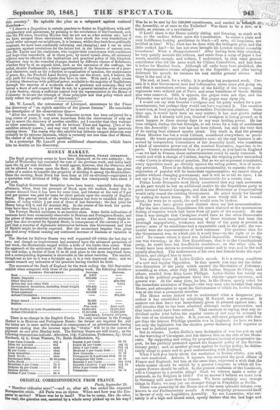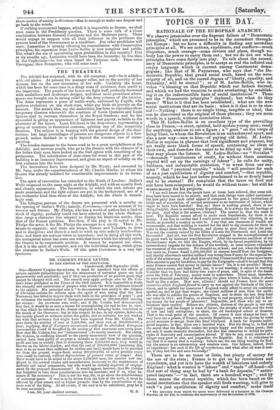ORIGINAL CORRESPONDENCE FROM FRANCE_ Paris, September 28. " Nascitur ridiculns
mus!"—and so, after all, has ended the expected Bonapartist crisis. All Paris was on tiptoe. When and how was the Em- peror to arrive? Where was he to land? Was he to come, like the other, the real, the genuine one, escorted by a whole army picked up on his way? Was he to be met by his 120,000 constituents, and carried in latkarlipt ttp'Ssiot the Assembly, or at once to the Tuileries? Was there to be a row, or a battle an dmeute, or a revolution?
0 lord! there is the House quietly sitting, and listening,
as much as it can, to the endless debate upon the Constitution. In comes a plain and very indifferent-looking gentleman in black—all eyes, all lorgnettes, are levelled at him! Why, what has he done with the redingote grise, and the little cocked hat?—he has not even brought his London special constable truncheon! What a disappointment! After having been duly admitted, he very quietly ascends the tribune, and reads from a scrap of paper a few words, sensible enough, and written, I understand, by that same general contributor who did the same work for Citizen Caussidi&e, and had done it before for Marshal Scull. Although all oaths have been abolished, the new Representative swears allegiance to the Republic; and after having delivered his speech, he resumes his seat amidst general silence. And there is the end of it.
The end, at least, for a while; it is perhaps but postponed work. Cer- tain it is that Government here had information about some plot going on, and that it entertained serious doubts of the fidelity of the troopa: some regiments were ordered out of Paris, and some battalions of Garde Mobile also were removed. Still, it appears, the grapes were not ripe, and the Pretender was advised to keep quiet. But grapes may ripen yet.
I would not say that General Cavaignac and his party wished for a pro- nunciamento, but perhaps they would not have regretted it. The occasion is now lost, at least postponed, of an immediate Presidential election. Some time ago, it would have been an easy matter; it has now grown rather difficult. As I already told you, General Cavaignac is losing ground; as it must happen in these stormy days to any man holding power. He has been obliged, during the last fortnight, to ask twice for a vote of confidence from the Assembly: the vote has not been refused, but still the very fact of its having been claimed speaks aloud. The truth is, that the present Prime Minister has but a weak Cabinet, considered everywhere as provi- sional He wants practical administrative men: all the real business is ab- sorbed by independent Committees of the Assembly itself, who constitute a kind of executive power out of the nominal Executive, imperiuni in im- perk. Under a constitutional form of government, as you have in England —as we hat! in France, these embarrassments could be easily removed. It would end with a change of Cabinet, leaving the reigning power untouched —the Crown is always out of question. But as we are at present constituted, every opposition must go directly against the ruling power; it is of neces- sity personal. There is no fiction, no conventionality, to separate from th expression of popular will its immediate representative; we cannot change politics without changing government; and it will be so till we have, I do not say a King, but only a President, irremoveable for a certain time.
Prince Louis Bonaparte most likely considered that any rash movement on his part would be but an additional motive for the Republican party to push forward General Cavaignac, and that the Moderates or Conservatives would rally round the existing Government. He acted wisely for himself by waiting for better times. He will act more wisely still if he remain silent; for were he to speak, the spell would soon be broken.
Parties here have grown more distinct since my last communication. After the late elections, Republicans felt much alarmed at the spontaneous feeling of reaction which had burst from all parts of the country. At one time it was thought that Cavaignac would turn to the ultra-Democratic party. The most unequivocal meaning of these elections had been the thorough unpopularity, weakness, and decay of the party at present in power: none of its candidates had a respectable rank in the poll; the suc- cessful were the representatives of both extremes. The question then for the Government was, to which side it would lean—to the right or to the left? To remain where it stood was indeed impossible. General Cavaig- nac was wavering: in the New Republicans, that is in the Constitutional party, he could have but insufficient confidence; on the other side, he would have been driven to revolutionary means and to war' and in the end equally absorbed. The recklessness of his own late friends broke the equi- librium, and obliged him to move. You already know M. Ledru-Rollin's speech. It is s strong manifesto of a new and regular Opposition. In that speech you may see the defini- tive disruption of the party which carried the Revolution of February; something as when, after July 1830, MM. Lafitte, Dupont de rEure' and others, seceded from King Louis Philippe. Ledru-Rollin has boldly set forth as his political programme these two objects—paper currency, and general war. At the same time he has, in the House, openly voted for the immediate admission of Rasp:til —the very man who invaded that same House, and attempted to upset the Government of which he, Ledru-Rollin, was at the time a prominent member. The House seems indeed not to understand what a dangerous pre- cedent it has established by admitting M. Raspail, now a prisoner. It matters not that leave was immediately given to proceed against him; it still remains that he has been admitted although under prosecution, and that leave could have been refused. That amounts to saying, that any in- dividual under trial before the regular courts of law may be released by. the vote of an electoral body. It is, you see, still more pregnant with dan- ger than the famous Privilege question was in England; for here we have not only the legislative but the elective power declaring itself superior to law and to judicial power.
But to resume. Ledru-Rollin's open declaration of war has put an end to the wavering of Cavaigrute, and has thrown him on the side of the Mode- rates. By supporting and voting for proportional instead of progressive im- post, he has publicly protested against the financial policy of the Revolu- tionary party; and, as another protest against its foreign policy, he delibe- rately clings to peace and to good understanding with England.
What I told you lately about the mediation in Italian affairs, you will see now confirmed. Austria, it appears, has accepted the good offices of France and England; but has, at the same time, expressed a wish that the whole matter should be settled by a general Congress, to which all Eu- ropean Powers should be called. In the present confusion of the Continent, will a Congress be a possible thing? Shall we witness again a series of protocols, as for Belgium in 1831? For an answer I believe we must look to Germany still more than to France. We have certainly seen strange things in Paris; we may yet see stranger doings in Frankfort or Berlin.
There was yesterday in the House one of the most splendid debates ever known in our Parliamentary annals. A strong majority pronounced itself in favour of only one Legislative Assembly. To see Lamartine, who cer- tainly is of a high and liberal mind, openly declare that the last he and
sheet-anchor of society is dictature—that is enough to make one despair and go back to the woods.
If nothing unexpected happen, which it is impossible to foresee, we shall soon come to the Presidency question. There is some talk of a closer combination between General Cavaignac and the Moderate party. These would engage to support with all their influence in the provinces the present head of the Government as a candidate. But other candidates will start: Lamartine is already effecting his reconciliation with Conservative principles; his separation from Ledra-Rollin is now complete and public. But what's the use of speculating upon probabilities in this country? Five or six months ago, Lamartine would have been the favourite; he was then in the Capitolium—he has since found the Tarpeian rock. Then came Cavaignac, then Bonaparte; who will come next ?



























 Previous page
Previous page